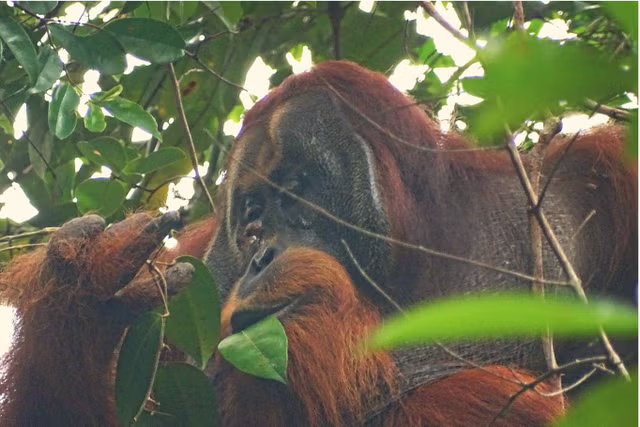An orangutan has been observed using a plant with healing properties to treat a wound on its face, in what scientists say is a first for wild animals.
Biologists witnessed the male Sumatran orangutan - named Rakus - chewing the leaves of a climbing plant known as Akar Kuning.
He applied the juicy mixture that was produced on to a wound on his right cheek for more than 30 minutes, until the injury was completely covered.
Scientists said he selectively ripped off leaves and chewed on them, before applying the resulting mixture precisely on to the injured area, just below his right eye.

There was no sign of infection in the following days, and in less than five days the wound was closed before healing completely inside a month, the researchers added.
The Akar Kuning plant, which is found in tropical forests of South East Asia, is known for its pain relieving and anti-inflammatory effects and is often used in traditional medicine to treat diseases such as dysentery, diabetes and malaria.
Rakus was not observed putting it anywhere else, so researchers concluded he was probably using the medicinal plant to treat the wound.
Dr Isabelle Laumer, a primatologist and cognitive biologist at the Max Planck Institute of Animal Behaviour, said Rakus had sustained the wound three days earlier, probably during a fight with a neighbouring male.
She said testing of the plant's chemical compounds showed it had a type of alkaloid, which contains "antibacterial, anti-inflammatory, anti-fungal, antioxidant, and other biological activities of relevance to wound healing".
Rakus was also observed resting more than usual after being wounded.
Dr Laumer said: "Sleep positively affects wound healing as growth hormone release, protein synthesis and cell division are increased during sleep."

What was less clear to the team was how the ape came to know of Akar Kuning's healing properties.
Dr Laumer said orangutans at the Suaq Balimbing research site in Indonesia "rarely eat the plant... [but] individuals may accidentally touch their wounds while feeding on this plant and thus unintentionally apply the plant's juice to their wounds."
In other words, Rakus may have discovered its benefits by accident.

Read more from Sky News:
Ex-politician beats wife to death in CCTV footage
Face of 75,000-year-old Neanderthal woman revealed
The team said its findings, published in the journal Scientific Reports, could help shed light on how the knowledge of wound medications evolved in humans.
It said this is the first time a wild animal has been observed using a plant with known medicinal properties to treat wounds.
The site in Indonesia is a protected rainforest area that is home to 150 Sumatran orangutans.
It's a critically endangered species, with around 7,500 left, the World Wildlife Fund said on its website.
Disclaimer: The copyright of this article belongs to the original author. Reposting this article is solely for the purpose of information dissemination and does not constitute any investment advice. If there is any infringement, please contact us immediately. We will make corrections or deletions as necessary. Thank you.



